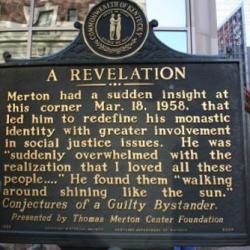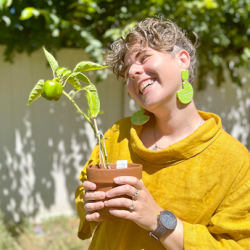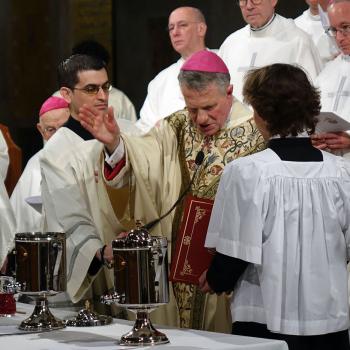And in Exodus 17 the themes continue to resound. Water is again the problem. Leaving the "wilderness of Sin," progressing on toward Rephidim (these places are lost to us historically, if they ever actually existed), the people complain to Moses about the lack of water (Ex. 17:2). Moses' own frustration now rises, as he shouts at them, "Why do you quarrel with me? Why do you test YHWH?" Who better than Moses knows now the mettle of his people? He sounds as if he is about done with them completely.
But the people persist: "Why did you bring us out of Egypt to kill us and our children and livestock with thirst" (Ex. 17:3)? And Moses now has had it, turning to YHWH again, this time in real fear for his own life. "What shall I do with this people? They are almost ready to stone me!" YHWH once again answers the people's and Moses' needs. YHWH tells Moses to go in front of the people to the rock of Horeb (another traditional name for Sinai), to take his magic staff, the one by which he parted the waters at the Sea of Reeds, and to strike "the rock of Horeb." From the rock shall flow water. And so it does. But Moses is hardly ready to forgive and forget; he names the place "Massah" (test) and "Meribah" (quarrel), reminding all future generations that when their faith was on the line, they in fact quarreled with and tested their God.
And in their quarreling and testing they were finally asking the most basic theological question that they could ask: "Is YHWH among us or not" (Ex. 17:7)? By what means are we finally to know whether or not the God we worship is here or is absent? Does it depend on continuous flows of water, magic portions of meat, ample supplies of desert bread, certainties of land promised, places always "flowing with milk and honey," with vast platters of barbecue thrown in?
In chapter 32, the people will give their answer to those questions when, instead of waiting for Moses' return from his chat with YHWH to inform them of their futures as God's people, they, with Aaron's artistic help, worship a tiny molten calf, loudly proclaiming that here at last "is the god who brought us up from the land of Egypt" (Ex. 32:4)! As Frederick Buechner so memorably said, "The Israelites know what we all know: a god in the hand is worth two in the bush!"
The stories of Israel in the desert are profoundly theological, asking their successors, and us, just how do we know whether YHWH is with us or not? Can we know only if God satisfies our every need, answers immediately our every whim? And when God does not so answer, are we ever anxious to form our own molten calf, our own substitute divinity, to meet our desires? A regular look at those old stories might do us moderns a world of good, helping us to look less carefully at our own molten calves and more carefully at the God who calls us to obey the call for justice in our assemblies.





